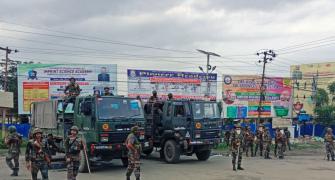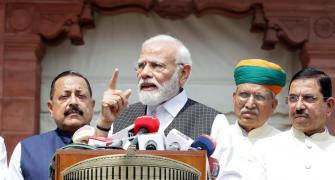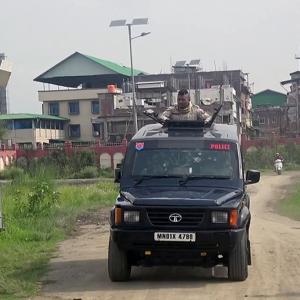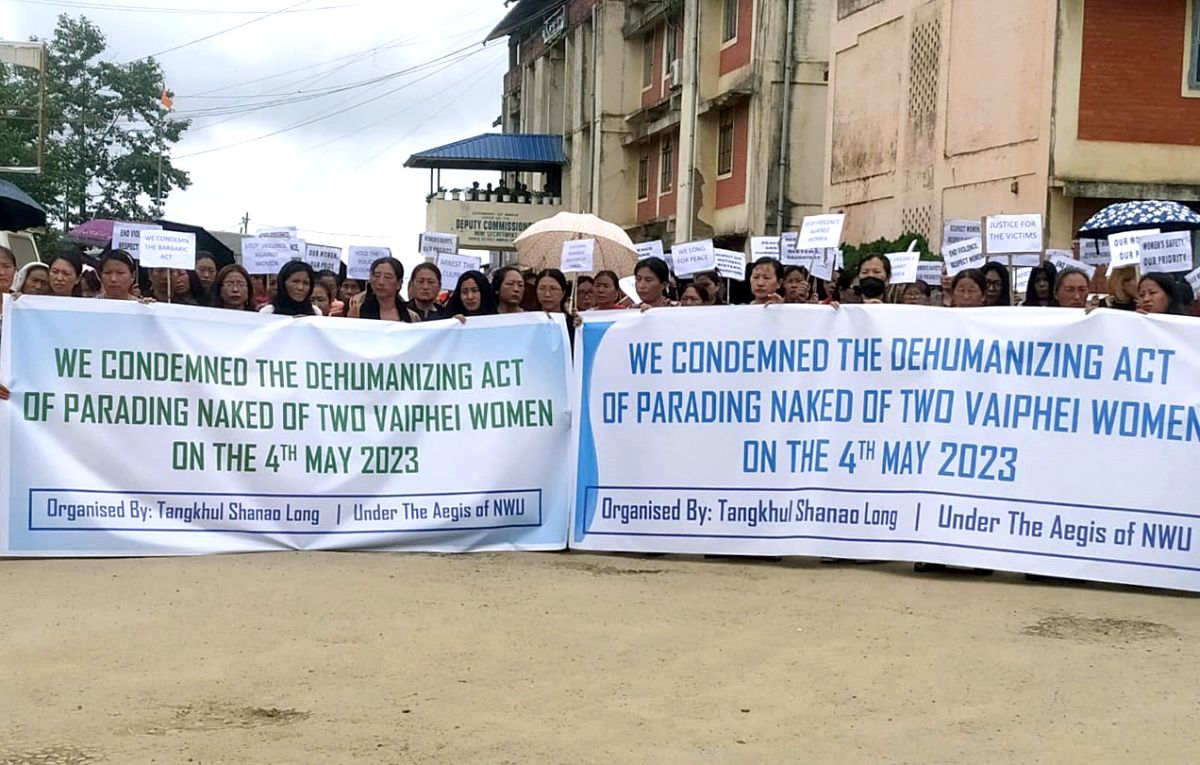Unless the anarchy in Manipur is brought under control quickly, we are sowing the seeds of a flare up in the entire North East and the end of our dream of checking China in South East Asia, warns Colonel Anil A Athale (retd).

On March 1, 1966, the Mizo rebels struck at 0230 am with clockwork precision at 33 posts in Mizoram.
The operation, code named 'Op Jericho', was executed after a careful preparation of over three months.
The Manipur violence and resultant anarchy, that is yet to be brought under control even after three months, is possibly the biggest challenge faced by the Indian State after those fateful events of March 1966.
The Government of India's response to the Mizo rebellion was swift and brutal.Indian Air Force fighter aircraft were used to strafe rebel held villages.
In less than a month's time, Aizawl, the capital, was secured.
The guerrilla war, that began in 1966, only ended after 20 years in 1986.
But 2023 is NOT 1966. The events in 1966 hardly made it to the national headlines, except for a brief period.
The North East was treated as another secessionist problem and the armed forces had reasonable freedom to operate and control the armed resistance in Nagaland and elsewhere in the region.
Today the North East is no longer isolated from the rest of the country.
With improved communication and people's movement, the region has begun to be part of the national mainstream.
Instead of being seen as a 'security problem', the North East is seen as a vital strategic bridge to South East Asia (ASEAN) and a counter to the Chinese belt and road initiative.
The North East has around 25 Lok Sabha seats. In a tight contest in the 2024 general elections, these 25 seats, currently held mostly by the BJP-led NDA, may well prove crucial at the national level.
The uncontrolled anarchy witnessed by Manipur for the last three months poses a direct threat to Indian strategic interests in South East Asia since Manipur and the Imphal-Moreh route is the best option to establish a land link with Myanmar and South East Asia beyond.
The geography of the North East is such that neither Nagaland nor Mizoram can provide easy road access (and later rail) to Myanmar.
The current conflict is not between Christians and Hindus, though Kukis are Christians and Meiteis Hindu.
It is also not about secession as both the sides carry the Indian Tricolour.
But it is no longer limited to Manipur as it has began to have repercussions in the neighbouring states.
Unless brought under control quickly, it has the potential to engulf the entire North East in a series of retaliations.
The immediate trigger for the inter-tribal killings was the Manipur high court hearings on Scheduled Tribe status to the Meitei community. A demand that has a 40-year history.
The valley dwelling Meiteis see this as legitimate.
The opposition to this potential move, voiced by the Kuki tribals, is equally valid as they fear threat to their land and culture through the dominance of the numerically strong and aggressive Meiteis.
This in a nutshell is the background to the current events. But this was neither new, nor unexpected.
What caused the mayhem is the partisan role played by the state administration and police, who openly sided with the Meiteis.
In every such situation, it is expected that the central government plays a neutral and fair role.
In this instance the central government, its agencies and paramilitary forces have failed in this role.
Incompetent and ignorant bureaucrats and politicians have brought about anarchy in the state.
More and more, the Manipur situation seems to resemble the 1990 genocide of the Kashmiri Pandits in the Srinagar valley.
Only the names are different, but the actors are the same, an aggressive dominant majority, partisan state apparatus and mute central government.
In the entire troubled history of the North East, the kind of anarchy that is seen in Manipur has never been experienced.
History is being repeated, but in a very different way.
The troubles in Manipur resembles the Bodoland movement in Assam and Gorkhaland agitation in Darjeeling.
The crux of matter is that the hill tribes in Manipur do not want to be part of the state.
The dominant Meitei community refuses to recognise this truth and continues to cling to the notion of an 'united Manipur'.
The Meiteis are living in the past and their historical memories of domination of the hill areas are colouring their judgement.
In the entire North East, peace has only been possible when the tribals got their own administrative units, all once upon a time part of Assam.
If Assam can be divided, why not Manipur is the question.
If the Meiteis give it cool thought, the Imphal valley with its riches and newly established rail, road and air links, can progress tremendously.
The demand of Meiteis for being classified as a Scheduled Tribe is justifiable.
It can be tweaked in such a way that they get the benefits at the central level at par with the other tribals in the North East, but not within North East tribal zones. This can be a win- win situation for all.
Like in case of J&K, it is time the artificial entity of Manipur is trifurcated with the Tangkhul dominated areas and Kuki areas are either given a separate autonomous status or merged with Nagaland/Mizoram.
Detailed negotiations need to be carried out with all the stake holders. One thing is certain, political status quo is unsustainable.
To bring the situation under control, the Armed Forces Special Powers Act needs to be promulgated. The major task is to recover the looted arms and ammunition.
After giving suitable warning, anyone in possession of looted weapons needs to be punished.
The police forces who stood idly by while the mobs looted the arms and ammunition need to be dismissed from service and punished for dereliction of duty.
Unless anarchy in Manipur is brought under control quickly, we are sowing the seeds of a flare up in the entire North East and the end of our dream of checking China in South East Asia.
Colonel Anil A Athale (retd) is a military historian who has studied counterinsurgency in Kashmir, North East, Northern Ireland, South Africa and Sri Lanka. His earlier columns can be read here.
Feature Presentation: Aslam Hunani/Rediff.com










